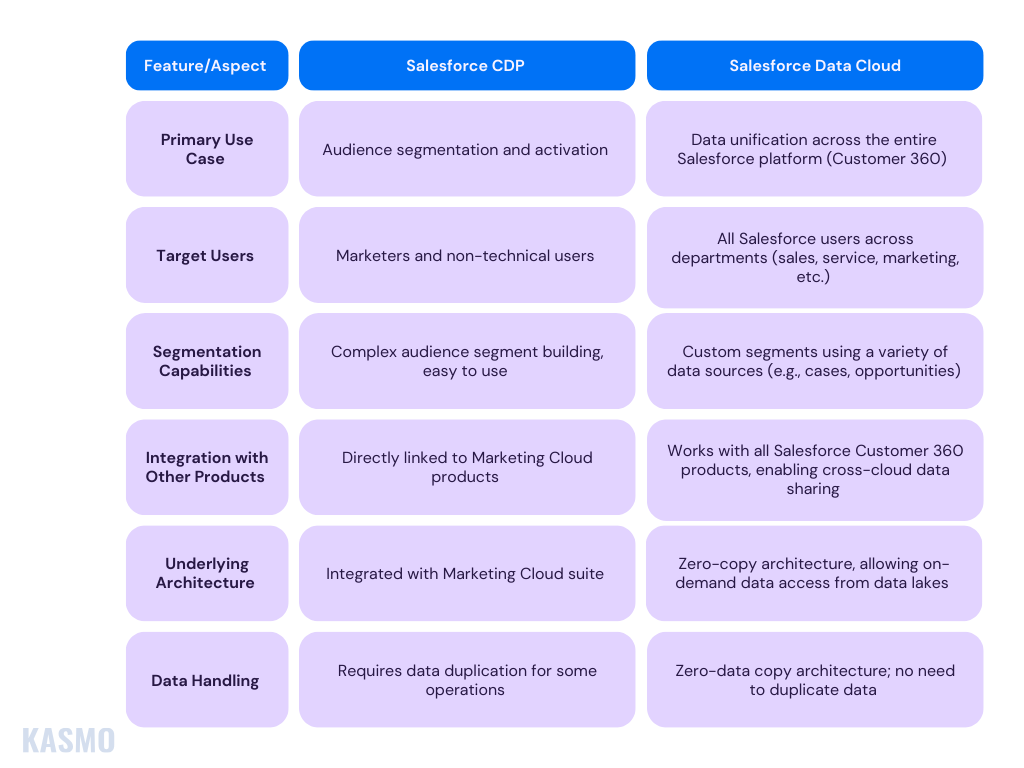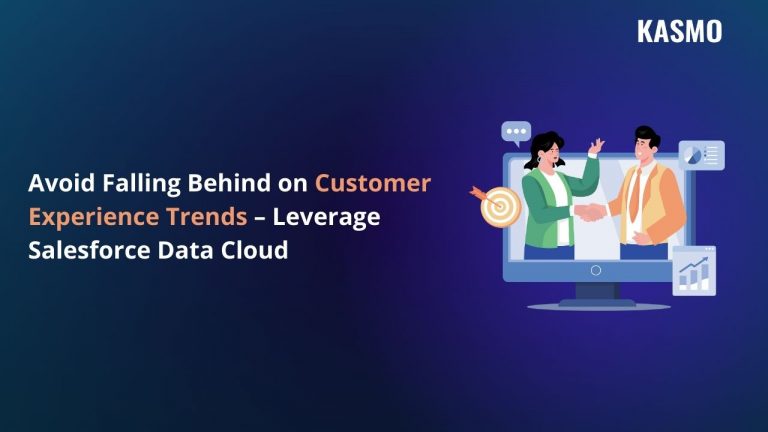Looking to follow the newest customer experience trends? But can’t because your data is stopping you? We have your solution here. Leverage- Salesforce Data Cloud. This is a real-time cloud platform that helps you unify your customer data, enhance customer engagements and facilitates seamless integration with your customer data platform (CDP).
Want to discover more about this Data Cloud Platform? Read the blog further!
What is Salesforce Data Cloud?
A Cloud Platform unifies vast amounts of data from multiple channels, data streams or any other systems. It facilitates businesses to enhance the customer experience by integrating data available at every step of the customer journey. Don’t worry about missing out on critical client information – this platform will create personalized customer profiles in near real-time.
According to research by Harvard Business Review 27% of customers are most likely to stay loyal to a brand and only purchase from them, if the business takes care of customer needs. This is easily achieved with the Salesforce Cloud Data Platform. Now participate in the latest customer experience trends like building brand loyalty, without worrying about fragmented and inaccurate customer data.
What is the Difference Between CDP and Salesforce Data Cloud?

How Salesforce Data Cloud Helps Businesses Stay Abreast With Customer Experience Trends?
Unifies Customer Data
Data Cloud provides a unified platform for all your data. It eliminates data silos and provides data accessibility throughout the organization. By integrating different types of data through a comprehensive library of connectors, this Data Cloud helps businesses tackle fragmented data challenges.
Utilizes the Metadata
Many businesses do not fully comprehend the power of metadata. Metadata is nothing but the data that describes other data including computer files, spreadsheets, documents, etc. Built on Salesforce’s foundational metadata layer, Data Cloud ensures a common language across all Salesforce applications and low-code services.
This integration supports advanced functionalities, including Einstein AI for intelligent insights, Flow for automation, Lightning for user interface enhancements, and Apex for deep, custom coding.
Unlocks the Power of AI With Data Cloud
Leverage this Data Cloud as it helps you to deliver trusted, secure and relevant outcomes without you having to spend both time and resources on training expensive data models. It unlocks the power of Gen AI when integrated with your company data. The Salesforce Data Cloud makes use of AI and helps businesses perform predictive analysis and derive real-time insights from customer data. This enhances customer experience and increases revenue, with good ROI.
Identifies Potential Leads and Closes Opportunities Successfully
Identify leads that have potential to turn into prospects with the Salesforce Data Cloud. Leveraging this platform will facilitate you streamline your sales process and close more deals. Additionally, it will help businesses focus on maximizing sales by discovering new upsell and cross-sell opportunities. It utilizes customers’ engagement data, boosting productivity and ensuring your sales team works more efficiently and effectively.
Improves Customer Service
Businesses can stay on top of customer experience trends by resolving cases faster and enhancing employees’ efficiency through proactive solutions. With Salesforce Data Cloud you can detect early warning signals, you can reduce churn and identify at-risk customers before issues escalate.
According to a report by Forrester 42% of decision-makers will use AI to create personalization strategies. This helps in creating personalized customer experiences, and tailored onboarding experiences. The Data Cloud uses data from external systems and applications and integrates them seamlessly for businesses to ensure a seamless customer journey.
Optimizes Marketing Strategies
For marketing teams, personalized messaging is essential. One of the important customers experience trends is crafting targeted campaigns using insights from data. This is achieved easily through Salesforce Data Cloud. It fosters better engagement with your audience.
Dynamic personalization also allows you to deliver automated journeys that cater to the individual needs of each customer. Data Cloud also helps businesses optimize marketing performance by gaining a customer 360 view of audience engagement.
Creates Data Harmony
Salesforce has developed a set of data models known as the Customer Graph that creates harmony between diverse data streams into a single customer profile. Once harmonized, all data contributes to a cohesive understanding of the customers’ profiles.
Engages with Data
A key feature of Data Cloud is its ability to resolve identities, consolidating a customer’s entire interaction history—both known and anonymous—into one unified profile. This capability is powered by a Lakehouse architecture, which simplifies the categorization and classification of various unstructured data types, such as medical records, which can often be complex to manage. As a result, Data Cloud enables quicker access to data, allowing businesses to leverage it effectively.
Conclusion
Salesforce Data Cloud offers a powerful solution for businesses struggling to get on with the latest customer experience trends. It also unifies customer data, enhances engagement, and streamlines processes across sales, service, marketing, and commerce. By breaking down data silos and providing real-time insights, businesses can create personalized customer experiences that foster loyalty and drive revenue.
With advanced features such as AI integration, metadata utilization, and proactive customer service capabilities, Salesforce Data Cloud equips businesses to meet and exceed customer expectations. Leveraging the Data Cloud platform allows businesses to harness the full potential of their data, making informed decisions and identifying new opportunities for growth.



